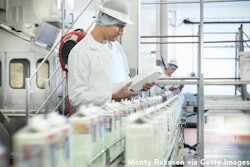Rabbi Moshe Elefant is the Chief Operating Officer of OU Kosher.
Keeping kosher is an ancient set of stringent dietary laws, derived from the Bible and preserved by the Jewish people for millennia. The most famous tenant is probably a prohibition on eating pork or the meat of other animals that, like pigs, lack split hooves and do not chew their cud. Kosher laws also strictly prohibit the mixing of meat and milk products and the consumption of shellfish, among many other requirements. But today, many people who are not Jewish seek out kosher products, as some of the prohibitions of the kosher system and the ways that kosher goods are produced and labeled make them especially suitable for vegetarians, vegans, individuals seeking a lower-cholesterol diet, those with allergies and followers of other faiths, such as Hinduism and Islam, that include dietary restrictions.
According to experts the total market for kosher products in the U.S. is some 35 million people, including about 1.3 million observant Jews. Indeed, since the late 1980s, the number of new kosher-certified products and ingredients has grown at an average annual clip of between 10% to 15%. And that trend is likely to grow. As more Americans cut back on eating meat, whether for health issues, concern over the environment, or even for economic reasons, they will be seeking out more products that don’t contain animal or animal-based ingredients—which aptly describes a large majority of kosher-certified products.
Here at the largest kosher supervisory agency in the world, we often receive inquiries from food manufacturers regarding the process of producing kosher products. For various reasons, there is often confusion as to what a manufacturer needs to do in order to become kosher, and for many brands, the process of obtaining kosher certification may seem intimidating. Indeed, the religious laws and the commentary around them is a complex topic often studied for years by those who become rabbis. However, implementing these standards in commercial facilities is actually a clear and efficient process, with accessible guidance and resources available from kosher certification agencies.
In fact, with the kosher market so developed today, and modern manufacturing practices already designed for cleanliness and separation of certain processes and ingredients, many companies that seek certification can often do it with minimal adjustments to their existing processes and ingredients. Here are some of the issues manufacturers need to consider when they consider kosher—and how those issues can usually be resolved to meet the demands of kosher laws.
It all starts with ingredients—and many are already kosher
Kosher-certified products, of course, do require kosher-certified ingredients, and the certification process begins with a review of ingredients used. This initial process can often be done online, with manufacturers specifying exact ingredient names, sourcing, and other relevant information. If the products in question don’t contain—or require—animal-based ingredients, they will likely pass that online inspection process.
Animal-based ingredients are more complicated, as they need to be derived solely from kosher animals, mainly ruminants including cattle and sheep, and poultry like chicken and turkeys. The animals also need to be slaughtered according to kosher rules, under rabbinic supervision. In addition, kosher-certified products cannot include any mixture of (even kosher) ingredients from meat and dairy sources.
In any case, chances are that many of the ingredients that food manufacturers use are already certified, especially if they don’t contain meat. In fact, there are well over a million kosher-certified ingredients, produced all over the world, that are available to food manufacturers today. The ingredient review by the certification agency will confirm whether the ingredients already in use are acceptable. If changes are needed, the agency will suggest viable alternatives that are easily accessible and priced similarly to the ingredients being replaced. The Orthodox Union maintains a large database of kosher-certified ingredients that manufacturers can consult when they need to make a swap.
One example of an ingredient sometimes needing substitution is glycerin, which is used in many beverages, dried fruits, dairy products, and other foods. Manufacturers can use glycerin derived from animals (usually tallow or lard), which do not meet kosher requirements. Or they could opt for one of the widely available kosher versions made from plant sources, making them eligible to carry a kosher certification symbol, and thus automatically expanding their market to include kosher-keepers and the many other groups seeking to avoid products with ingredients derived from animals.
Most modern production processes comply with kosher requirements
One of the principles of kosher certification is that production lines need to be utilized only for kosher products. Agencies won’t certify production lines that produce kosher and non-kosher items simultaneously. But that situation is rare in modern production systems. In most cases, lines are used to produce runs of specific products, and facilities that produce many products for many brands will ensure that there is no cross-contamination between productions. As brands and manufacturers know, the sterilization process—CIP (clean in place) in most facilities—is an absolute must, and often already in place. CIP is necessary to avoid being held liable for issues such as lactose intolerant consumers eating dairy-based ingredients, gluten-sensitive consumers eating wheat, and many other situations.
Certification agencies will also require that a production line be fully sterilized in order to ensure that there is no cross-contamination between kosher and non-kosher products, as well. The CIP processes manufacturers already utilize to prevent product cross-contamination is sufficient—and often exceeds—the sterilization requirements of certification agencies. Agencies will of course review and supervise the sterilization process at a facility, but if that process entails standard CIP procedures, certifying production should not be an issue.
Certification is an investment for brands
With inflation persistent, many brands today are seeking to conserve money. In such a market, many may question the wisdom of taking on an extra expense. But most brands and manufacturers making kosher-certified products look at the expense as an investment in reaching new markets and consumers. In fact, the small kosher symbol on a product is likely to increase sales—by some 20%—versus a competing product that doesn’t have that symbol, research shows.
Once brands understand the relatively low costs involved, both in terms of money and in terms of adjusting ingredients or manufacturing processes, they see kosher-certification in a different, more realistic light. While kosher laws are derived from numerous ancient biblical and rabbinic texts, the actual practices are well-defined and within reach of commercial food producers today—especially for those striving to reach wider audiences and keep up with consumer trends.





















